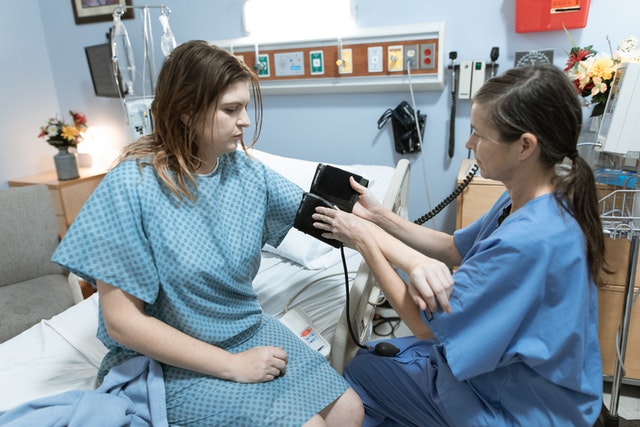Everybody has their own problems. Nearly 1 in 5, or 50 million Americans, have a mental health issue. These people need sensitive mental health treatment. Psychiatric technicians help those with mental illness. How do psychiatric technicians and aides work? Find these answers and more in our career guide.
Psychiatric Technicians And Aides Responsibilities
It’s often believed that to work in psychology, you need a Ph.D. That is true for licensed clinical psychologists, but entry-level employment doesn’t require advanced degrees or clinical training. Psychiatric technicians are entry-level.
The psychiatric technician is an entry-level worker who offers immediate mental health treatment. They’re the main point of contact for inpatients.
Since psychologists and psychiatrists cannot spend hours with each patient, so they depend on psychiatric technicians. Technicians monitor patients’ progress and carry out particular treatment regimens. Job tasks vary by hospital and patient population.
Some psychiatric technicians do:
- Age-related mental diseases, including Alzheimer’s and dementia
- Disorders of growth
- Addiction technician disorders
Credentials For Psychiatric Technicians
A few abilities and qualities are necessary for these professions. Among them:
- The ability to empathize with others
- Positivity is essential for success.
- Effective communication and teamwork
- A person’s ability to keep going for long periods.
- Inquiry-based abilities
- Patience
In addition, all communications with patients must be kept private.
What Does A Psychiatric Technician Do?
Several typical psychiatric technician duties vary by institution and patient demographic. Technicians monitor and evaluate patients and deliver therapy. A psychiatric technician’s day may include the following:

- Assist with the admissions and discharging procedures of patients
- Check patients’ blood pressure and pulse.
- Keep a close eye on the conduct of patients, take notes, and pay attention to the issues that worry them.
- Execute some of the psychiatrist’s treatment plans by providing drugs.
- Help with therapeutic and recreational activities for patients
- Support with feeding and grooming should be provided to patients regularly.
Sometimes, Psychiatric technicians may need to restrain violent patients.
Patients at an inpatient hospital interact mainly with psychiatric technicians. A technician’s empathy may help the patient progress.
Psychiatric Technicians Vs. Aides
“Psychiatric technician” and “psychiatric aide” are interchangeable words. Technicians and aides have overlapping roles, such as monitoring patient behavior and helping with ADLs.
Aides can’t administer medications or direct therapeutic activities, unlike technicians. Instead, aides may do the following:
- Changing the sheets on your bed
- Moving patients
- Physical Activities
- They are helping patients with their hygiene routines.
Due to differing tasks, technicians and aides have varied educational and academic requirements. Most aides don’t have degrees. After high school, most join the workforce and get on-the-job training.
Where Do Psych Techs Work?
Healthcare clinics hire most psychiatric technicians. Some are state-funded, and others are private. Psychiatric technicians may also work in general hospitals’ psychiatric wards.

State and municipal agencies, including public health, recruit technicians. Less often, technicians work in outpatient mental health and drug misuse treatment centers.
Psychiatric Technician Career
If the answers to “What are psychiatric technicians and aides and what are their responsibilities?” appeal to you, it’s time to plan your professional path. See your high school counselor. Discuss your professional aspirations and how high school may help them.
After high school, get a bachelor’s in psychology. Your degree selection is flexible. Mental health therapy or behavioral health science may also work.
You may specialize your degree, such as in drug use problems. If you choose and if it corresponds with your professional goals, you can get a degree with a specialization. If you select a focus, you may still work in mental health outside of that specialization.
Studying Psychology
After high school, seek higher study to become a psychiatric technician. Those with four-year degrees will have better work possibilities as psychiatric technicians. A four-year degree can also prepare you for graduate school if you want to pursue higher-level mental health tech jobs.
A BS in Psychology is ideal for psychiatric technologists. Learn about scientific inquiry, research, and evidence-based psychological treatments. You’ll also learn:
- Psychological symptoms, diagnosis, and therapy, as well as abnormal psychological patterns
- Freudian, humanistic, and cognitive behavior theories
- Child and teen development
- Psychological, mental, and emotional adult and geriatric development
- Sensation, perception, metacognition, awareness, and lifetime mental development.
Depending on your college, you may also take a senior capstone course. A capstone course requires a semester-long project. This writing- and research-intensive course lets you apply everything you’ve studied in the last three years.
Talk to your school’s student services department regarding internships. By interning in a local mental health hospital or organization, you’ll learn valuable skills, improve professionalism, and grow your professional network. You’ll see mental health center procedures firsthand.
Licensing And Certification
Most psychiatric technicians are unlicensed. Only California, Arkansas, Kansas, Missouri, and Colorado need a license by 2022, and five states have pretty different licensing requirements.
Some states need confirmation of postsecondary education hours, while others require on-the-job experience. Most states need an exam and a cost.
If you want to work in a state requiring a psychiatric tech license, ensure your degree program meets the qualifications. You may seek optional certification even if you don’t need a permit.
A psychiatric technician qualification isn’t required but might be beneficial. Certified technicians may get a higher income and a better benefits package, which may improve patient care.
The American Association of Psychiatric Technicians certifies psychiatric technicians (AAPT). AAPT approves four levels, and a level-4 psych tech has a bachelor’s degree and 3 years of experience.
Technicians seeking certification must pass the level one test with the lowest qualifying standards. This is a home, open-book test, and an essay exam is necessary at higher levels.
If you don’t want to get certified, visit the AAPT website once you graduate. This nonprofit often advertises psychiatric technician jobs.
Learn On-The-Job
After earning your psychology degree and licensure, you may apply for psychiatric aide jobs. On-the-job training is typical for new psychiatric technicians. Depending on the organization, this may be a structured training program or informal mentoring.
During your on-the-job training, you’ll work closely with patients. You may need to finish a structured training program using computer modules. Some technicians attend lectures and seminars to improve their mental health knowledge and working abilities.
Demand For Psychiatric Techs?
Psychiatric technicians and aides are in great demand. Many of these new jobs will replace retiring or leaving psychiatric technicians. Also, trained experts are needed to care for the aging population since old age is commonly connected with dementia. Detention centers will need psychiatric technicians.
Also visit: 10 Signify Health Issues: Try To Avoid Them The Soonest
